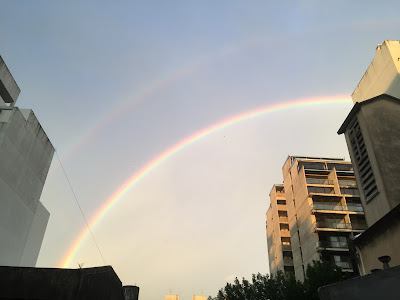 |
| Sharing a Dream |
Most weekday afternoons and a rare early morning I take a bus from my city to the small locality called City Bell to my “work site”. My program is a facet of the Lutheran church yet my work is not; I volunteer at a non-profit called Compartieno Un Sueño, a grassroots community center that focuses on children and their families regardless of faith or political alignment. The name of this dynamic organization translates to Sharing A Dream which, coincidentally, represents my view of missionary work very well. I am here to witness, learn and understand; not to push or force my views on anyone.
Compartieno Un Sueño serves around 50 families living in poverty. When I explain my work to people from the U.S., I compare it to an after school program. The space is open weekdays from 9 in the morning until 7:30 at night and each day hosts different workshops. This includes sessions like homework help, ceramics, cooking, art and music, and dance. There is also a certificate program for adults to finish their primary school education that meets once a week. Every day at 5:30 it is time for merienda which is something like snack time as most Argentines typically do not eat dinner until after 8pm. All are welcome to stop by for a snack and something hot to drink during cold months.
When I speak to people here in Argentina, I call it a comedor, a place people can receive free meals. Besides the daily merienda every other Saturday families come to receive dry goods for their home. I have helped prepare the many bags of flour, noodles, beans, oil and cans of food and I am shocked at how many people are fed by CUS.
In my struggles of knowing so little of the language, lacking knowledge of my workplace is one of the most frustrating. From day one I felt warmly welcomed and wanted; yet I did not fully understand the history or purpose of the program. It has taken me a long time to piece together information of the relationships between the people, the roles they play in the organization and the realities of the hardships of the community. I’m am embarrassed to say it took me almost 2 months to comprehend that everyone was volunteering their time!
 |
| Counting fingers and helping each other with math during Apoyo Escolar |
Compartieno Un Sueño was began by one woman over ten years ago in response to the need in her community for children to be fed. These children on average had one meal a day at school and went to bed hungry. Paula Gil renovated her garage into a space for nurturing and nourishing; creating a fairly large, multipurpose room and adding a kitchen and bathroom. Today, the walls are brightly colored with artwork and the space is jam packed with books and supplies.
The mission began with addressing hunger, starting with a daily snack then later adding food for dinner that each family took home. But soon another need became obvious: along with food there must be other nourishment that allows each child to be a full person.
I am still figuring out what this means. I know that the children live in poverty; that crime, drugs, violence are all problems in their community and families. Some of their houses are lacking flooring or glass windows and have walls and a roof made out of scrap materials. I know that the children are labeled as bad kids just for where they come from - and, unsurprisingly, they often behave that way. That the stereotypes are sometimes fitting; I know kids with sunny personalities and adequate school supplies and kids with attitudes, rough edges and wearing yesterday’s dirty clothes. Kids who are called dangerous by people who ignore that it is the kids' living situations that are the real danger.
My lack of understanding has made me cautious in sharing my work as I am afraid to misinterpret or convey wrong ideas. However, perhaps even if I spoke perfect Spanish I would still struggle to decipher the nuances of the context. Because when I think of discussions of poor neighborhoods of Toledo, I think of the disagreements and discord. I think of the radically different views in terms of societal and personal responsibility and general lack of comprehension of the causes of poverty that are deeper than income.
As my understanding of castellano grows, so does my understanding of both the basic and the complex. In the meantime, I will continue witnessing, participating and being myself.
This week it is full on summer vacation so the workshop for homework help has been turned into games, art, and reading. I helped with tie-dying, played Jenga (or whatever they call it here), and decorating the space for Nochebuena (Christmas Eve). I know all the popular hand clapping games, most which are variations of 'Rock, Paper, Scissors' and once tried to translate one of my own which was met by confusion. I am excellent at Veo-Veo (I-Spy) because it involves pointing but the spelling in Ahorcado (Hangman) gives me problems. I also eat merienda with the kids, something that no other adults seem to do but I guess it’s fine.
I do not need fully understand in order to be present. Through participation and relationships I can share myself with these amazing people as they have shared so much with me.
| Kids everywhere love balloons! Here they drew faces on them :) |
 |
| The girls who study social work at the university brought the balloons, games and smiles |





















